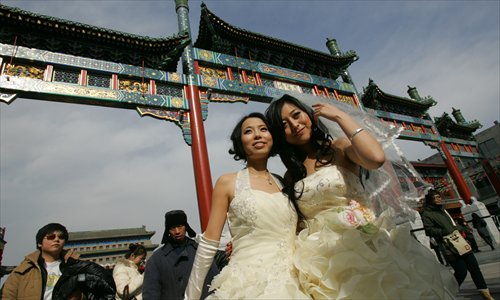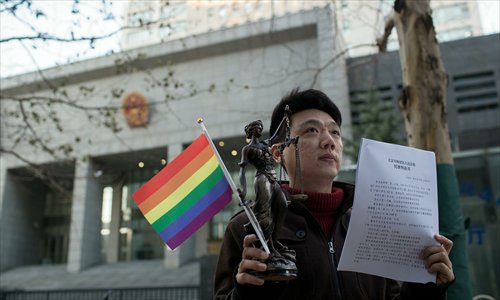Gay marriage advocates ask legislators to present their proposals at the two sessions

In order to call public attention to LGBT rights, two lesbians pose for wedding photos in Beijing's Qianmen area on Valentine's Day, February 14, 2009. Photo: CFP
Before the two sessions, Lin Xianzhi busied himself sending letters.
The 61-year-old retired civil servant from Ganzhou, Jiangxi Province is the father of a gay man. Starting in 2014, he spent months talking with legal experts and wrote up a proposal for legalizing gay marriage. He mailed the proposal to 1,000 legislators and advisors with the help of volunteers.
The country's annual legislative and political consultive sessions, known simply as the two sessions, that closed on Sunday were a busy time for representatives and government officials. But they were also a busy time for activists.
Worried parents
Ran Ran, a National People's Congress (NPC) deputy from Chongqing Municipality, proposed at the two sessions that information about homosexuality should be included in textbooks used in higher education institutes, so that it can be discussed in classrooms and students can have a more objective view of homosexuals.
Ran said at the meeting that people should be taught scientific knowledge of homosexuality and that the government should pass laws and regulations to ensure the basic rights of gay people, according to China National Radio.
This was seen as a very progressive request, especially given the fact that homosexuality was officially categorized a mental illness in China up until 2001, even though it wasn't the original gay marriage proposal Ran took with her to the two sessions.
Before the meeting, Ran reached out to the Guangzhou-based Parents and Friends of Lesbians and Gays (PFLAG) organization and Li Yinhe, a renowned sexologist, after she received a letter from Lin Xianzhi.
The letter called for the legalization of gay marriage, and came with the proposed law attached. Li also wrote a proposal that expressed support for the legalization of gay marriage to give to Ran.
Lin has been an active member of PFLAG since he came to accept his gay son, Xiaotao, who came out to him in 2011. Lin said at first he went through all the steps that most Chinese parents go through when they find out their children are gay, such as denial and anger.
But after talking with other parents, he began to accept his son, and eventually started developing the idea of writing a proposal regarding legalizing gay marriage in China.
"They live together right now and our families socialize like in-laws," Lin said. "Even though our country doesn't have this law, they are still spending their time together and would like to be together for a long time."
The parents of gay children often worry about these matters, Lin said.
"The most practical one is, if one of the couple gets sick, the other can't even sign the medical form as a family member," Lin said.
Some other worries concern disputes, property division, and adoption. Right now there is no legal protection in these areas and many parents worry about their gay children in this aspect.
Zhou Yanghai, Xiaotao's boyfriend, said that in fact this is the reason many parents are having a hard time accepting their children. Parents worry about how their children will live together and grow old, without their rights being safeguarded.
"It's all practical stuff, it's not romance," Lin said. "It's the same with marriage between men and women too, when they decide to be together. It's all about rights and responsibilities."
Besides, there is a large group of people who have to deal with these issues, Lin said.
A report by Chinese health authorities in 2004 said that there were more than 10 million male homosexuals living in China, but sexologist Zhang Beichuan has estimated that there are at least 30 million homosexual Chinese.
After writing his proposal, Lin sent the draft to many lawyers and experts to hear their opinions, and eventually mailed it to 1,000 NPC deputies and members of the Chinese People's Political Consultative Conference (CPPCC) prior to the two sessions this year.
He only received a response from Ran. Even though she didn't present his proposal and chose to present her own gay rights proposals, Lin is happy that at least this year there was a voice speaking in favor of people like his son during the two sessions. He is in favor of her pro-education proposal as he thinks it's impossible to change the marriage law in China all of a sudden, especially when people don't know much about homosexuality.
Spreading awareness
Zhou and Xiaotao will get married in the US this summer. They were one of 10 gay Chinese couples who were chosen as part of a special Valentine's Day event to hold a group wedding ceremony in West Hollywood, California.
The event was organized by non-profit LGBT organizations such as Danlan.org and Taobao, Alibaba's e-commerce platform, as part of an effort to generate respect and understanding for gay people in China.
The competition started on January 23 and underwent three phases with more than 400 gay couples registering and 20 couples making it to the final round.
Those who registered uploaded videos of their love stories and the final couples were selected based on the votes they received from netizens in an open online poll.
Zhou said that the idea of getting married had never been one they considered previously, but they were living together like a married couple.
During the first two years of their relationship, Xiaotao and Zhou worked in two different cities, Suzhou and Shanghai. Then Xiaotao moved to Shanghai and they started living together. Their relationship became stable, their families started meeting each other and they, in every way other than legally, were married.
Then the LGBT nonprofits and Taobao cohosted the event, and Zhou was interested, even though he knows they won't enjoy any legal benefits from the marriage.
"We know this marriage won't be recognized by Chinese law, so this ceremony will probably only be a ceremony," Zhou said.
But the people who signed up believe this is a chance to spread knowledge to the public.
Right now, gay couples in China have to find their own ways to protect their rights.
Anwei and Yebin, a gay couple who live in a rural part of Hebei Province, signed a contract between them, saying if they split up, they will divide their common property and house between them, just as a married couple would in that situation.
Campaign for change
But more often than not, their rights are not protected. In order to help China's gay community, Li Yinhe, one of the first sexologists to publish books on homosexuality, started advocating the legalization of gay marriage in 2000.
At that time, the NPC proposed revising the marriage law and sought suggestions from sociologists and legal experts. When Li proposed adding gay marriage to the law, others dismissed her argument saying simply that China doesn't need to take the lead in this matter.
In 2001, Li asked an NPC deputy from Shanghai to take her pro-gay marriage proposal to the two sessions. In the end the deputy wasn't able to submit the proposal because a proposal needs signatures from 30 other deputies to be accepted and he couldn't find that many people who would put their names to the document.
Li then asked a CPPCC member to advocate on behalf of the gay community. The member did, but asked Li not to reveal their discussion as it is a sensitive issue.
Since then, Li has written blogs every year calling for deputies to bring her proposal to the two sessions.
Even though she hasn't received much of an official response, Li believes that Chinese society is ready for gay people to have greater rights.
"In 2008, I did a survey about people's attitude on homosexuality. Compared with the US, where 47 percent voted for gay marriage, 43 against and 10 percent are undecided, in China only about 10 or 20 percent people agree or disagree, most of the people are undecided," she said.
Hu Zhijun, the executive director of PFLAG, said they have been trying to change the situation through the courts. The group reaches out to lawyers who might be friendly to the organization and offers the lawyers training sessions, so that when gay people face a legal dilemma, they have experts that are sensitive to their specific needs to whom they can talk.
Some of the issues covered in the sessions include adoption, domestic violence and the skewed perspective on homosexuality presented in some of the country's schools.
"The focus of the training is to find more lawyers to help homosexuals, and we've seen an increase in the numbers of lawyers coming for the training sessions," Hu said.
A recent case was the lawsuit filed by a gay man against Baidu.com and the Chongqing-based clinic Xinyupiaoxiang, which used shock treatment in what it described as "conversion therapy" to turn him into a heterosexual. The case was supported by lawyers in the network and in the end the court ruled in favor of the man.
Hu thinks that at present, as gay marriage isn't likely to be legalized in the short term, education might be the best option. He hopes that through education, young people might become advocates for gay rights and become a force for change.

Xiao Zhen shows the court's verdict and a rainbow flag after he won his lawsuit against Baidu.com and the Xinyupiaoxiang clinic on December 19, 2014. Photo: IC
Newspaper headline: Over the rainbow